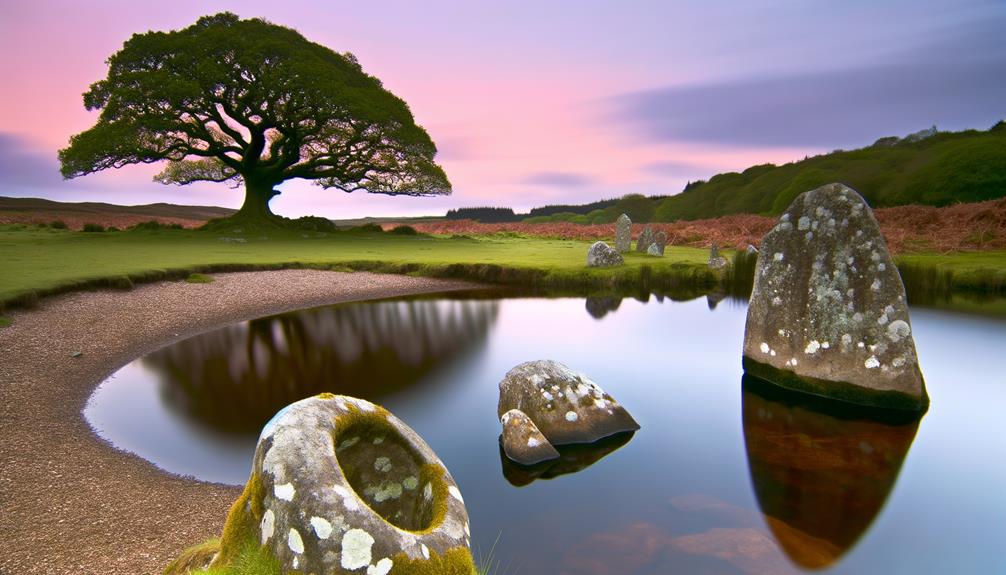Meaning of the Name Callan
The name Callan originates from the Gaelic surname Ó Cathaláin, meaning 'descendant of Cathalán.' The root name Cathalán translates to 'battle mighty,' with the suffix -án denoting 'little' or 'junior.' Historically, Callan is linked to warriors and strength, appearing in medieval chronicles and folklore. Culturally, its significance spans media, literature, and film, reflecting an enduring influence.
In modern usage, Callan's gender neutrality and phonetic simplicity give it global appeal and a contemporary sound. Prominent figures such as actor Callan McAuliffe further enhance its recognition.
The full narrative offers more insights into its cultural and historical depth.

Key Takeaways
- Callan is derived from the Gaelic surname Ó Cathaláin, meaning 'descendant of Cathalán.'
- The root name Cathalán translates to 'battle mighty,' signifying strength and warrior-like qualities.
- The suffix -án implies 'little' or 'junior,' adding a diminutive aspect to the name.
- The name Callan is gender-neutral, making it versatile and modern.
- It has cultural significance and historical roots in Gaelic and Celtic traditions.
Etymology
The name Callan is derived from the Gaelic surname Ó Cathaláin, which signifies 'descendant of Cathalán.' The root name Cathalán itself originates from the Gaelic name Cathal, meaning 'battle mighty.' This etymological lineage underscores a heritage associated with strength and valor.
The suffix -án is a diminutive, often used in Gaelic to denote 'little' or 'junior,' indicating a familial relationship. Historically, surnames prefixed with Ó were used to denote lineage, signifying a connection through male ancestors.
This detailed etymology provides a clear understanding of the cultural and linguistic origins of the name Callan, reflecting a deep-rooted tradition within Gaelic nomenclature. Understanding this etymology enriches our appreciation of the name's inherent meaning and historical context.
Historical Significance
How has the name Callan been historically significant within Gaelic culture and beyond?
The name Callan, derived from the Gaelic word 'cathal,' meaning 'battle,' holds deep historical roots in Irish and Scottish heritage. It was often bestowed upon warriors and individuals of notable strength, symbolizing valor and resilience. Historically, figures named Callan have been documented in medieval chronicles and local folklore, emphasizing the name's association with leadership and martial prowess.
Beyond Gaelic culture, the name migrated through centuries, appearing in various forms across different regions, carried by waves of migration and interaction. This diffusion has allowed the name Callan to maintain its relevance, embedding itself into the broader cultural and historical narrative of the Celtic diaspora.
Cultural Impact
The name Callan holds significant cultural weight, evident through its historical roots and contemporary presence in media. Historically, Callan has been associated with notable figures and events that have shaped cultural narratives.
In modern media, the name has been popularized through various forms, underscoring its enduring relevance and adaptability in different cultural contexts.
Historical Significance of Callan
Rooted in historical contexts, the name Callan has permeated various cultures, reflecting its enduring influence and significance across different eras. Historically, Callan is derived from the Gaelic name 'Cailean' or 'Collin,' translating to 'battle' or 'rock.' This etymology underscores a legacy of strength and resilience.
In medieval Scotland, the name Callan was often associated with fierce warriors and leaders who played pivotal roles in battles and clan dynamics. Additionally, the name appears in Irish history, notably in the Battle of Callan (1261), a significant conflict between the Normans and the Gaelic forces.
This historical backdrop accentuates Callan's association with strategic prowess and cultural fortitude, cementing its place as a name synonymous with historical and cultural heritage.
Callan in Modern Media
Callan's presence in modern media underscores its cultural impact, evident through its use in literature, film, and television, where it often embodies themes of strength and resilience.
In literature, characters named Callan frequently exhibit qualities of determination and fortitude, resonating with readers. Film and television further amplify this portrayal, with protagonists named Callan depicted as leaders or warriors, enhancing the name's association with bravery and leadership.
This consistent representation across various media platforms not only elevates the name's stature but also reinforces its symbolic meaning. Analyzing these portrayals reveals a deliberate choice by creators, leveraging the name's historical connotations to craft compelling narratives that resonate with contemporary audiences, thereby cementing Callan's enduring relevance and cultural significance.
Modern Usage
In contemporary contexts, the name Callan has gained prominence across various cultures and regions, reflecting its versatile appeal and modern adaptability. This name's rise can be attributed to several factors that underscore its growing popularity in modern times:
- Gender Neutrality: Callan is increasingly chosen for both boys and girls, making it a flexible option for parents.
- Global Appeal: The name's simplicity and phonetic clarity render it easily recognizable and pronounceable in various languages.
- Cultural Integration: Callan blends seamlessly into diverse cultural backgrounds, enhancing its universal acceptance.
- Modern Aesthetics: Its modern sound and sleek structure align well with contemporary naming trends.
- Positive Connotations: The name often carries connotations of strength and grace, appealing to a broad demographic.
Such attributes highlight Callan's relevance in today's naming conventions.
Famous Namesakes
How has the name Callan been immortalized by notable individuals throughout history and popular culture?
The name Callan has been carried by several influential figures, adding a layer of prestige and recognition.
In the world of sports, Callan Ward stands out as a celebrated Australian rules footballer, whose career has greatly enhanced the name's visibility.
Additionally, Callan McAuliffe, an Australian actor known for his roles in films like 'I Am Number Four,' has brought the name into the spotlight within the entertainment industry.
Moreover, Callan Mulvey, another actor with an impressive portfolio, including appearances in '300: Rise of an Empire,' has also contributed to the name's prominence.
These individuals, through their achievements, have solidified the name Callan in public consciousness.
Symbolic Qualities
Beyond the recognition brought by notable individuals, the name Callan holds symbolic qualities that reflect strength, bravery, and a sense of heritage. Derived from the Gaelic 'O'Cathalain,' meaning 'descendant of Cathal,' it embodies attributes associated with warriors and leaders.
The name Callan is often linked to the following symbolic qualities:
- Strength: Represents physical and mental fortitude.
- Bravery: Signifies courage in the face of adversity.
- Heritage: Connects to rich cultural and familial traditions.
- Leadership: Reflects qualities of guidance and influence.
- Resilience: Demonstrates the ability to withstand challenges.
Each of these characteristics not only enriches the name's historical significance but also resonates with contemporary values, making Callan a name that carries profound meaning across generations.
Conclusion
The name Callan, with its roots deeply entrenched in etymology, history, and culture, has evolved to embody strength and adaptability.
Like a river that carves its path through varying landscapes, Callan has transcended time, retaining its relevance from ancient battles to contemporary usage.
Its symbolic qualities, mirrored in the achievements of notable namesakes, underscore a legacy of resilience and honor.
Consequently, the name Callan continues to resonate with a timeless appeal and enduring significance.






